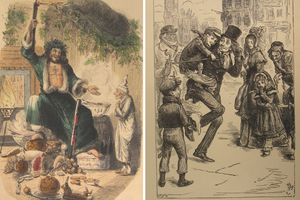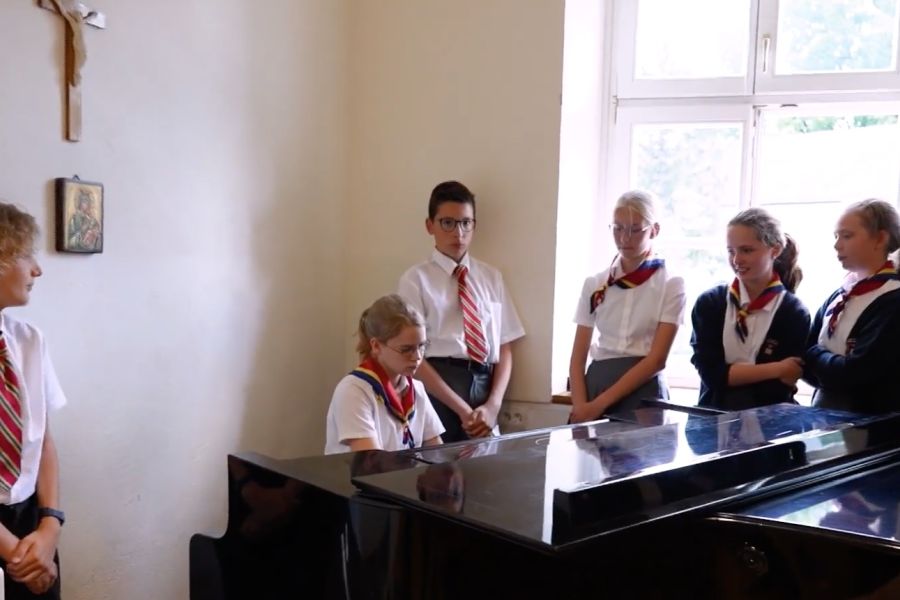New Catholic Classical Education Schools Advance as Pandemic Recedes
New in-person, hybrid and online schools in the Church’s tradition of the liberal arts and sciences are set to launch.

CHARLESTON, S.C. — When the COVID-19 pandemic struck, Catholic parents at Corpus Christi Catholic Church became more determined than ever to launch a new Catholic high school.
Now, Corpus Christi Academy is one of many new Catholic schools in the classical liberal arts tradition that are getting ready to launch this fall, with in-person, hybrid or even online education models.
“Classical education prepares students for their careers, through things like problem solving, creative expression and deep thinking. And it also provides them the sort of emotional tools to get through life as well,” Nicole Koopman, Corpus Christi Academy’s head of school told the Register. She said the new school is built on four principles of Catholic “sacred wisdom, sacred worship, sacred art and sacred music.”
“Corpus Christi Academy is going to offer this integrated experience,” she said. Instead of high-school education being seen as immersion in discrete subjects, Corpus Christi’s high-school students would see how the subjects of study relate to each other. “As Christians, we believe that all knowledge is ultimately connected and unified through our faith.”

All students will learn how to sing and read sacred music, and they will belong to the choir and learn how to chant.
The beauty of Catholic classical education, Koopman added, is that teachers can meet students where they are at and serve as mentors.
“We're training the students to take part in intelligent conversations, reading and discussing primary source texts with faculty,” she said.
Koopman said Catholic parents started intensifying years of discussions on how to give their children a Catholic classical education back in 2019, and over the course of the pandemic, they made plans in earnest to open a new high school through Corpus Christi Catholic Church, a parish of the Ordinariate of the Chair of St. Peter, in the fall of 2021. Koopman came on board as head of school in 2020, having both personal experience of a Catholic classical education for high school and observing firsthand the need for it in college-age students she has taught.
“Classical high schools provide tools which are ultimately useful in any field,” she said, adding that this Catholic liberal arts formation affords students a solid foundation as they specialize at the university level.
The school’s first year will launch with a ninth-grade class as a homeschool hybrid. The following year will be completely in person and see a new grade added each year afterward until it is a full high school.
Koopman explained that the school will emphasize “the rhythm of the Church,” from homeroom teachers leading students in praying Morning Prayer from the Church’s Liturgy of the Hours to celebrating special feasts with Mass.
Charleston Bishop Robert Guglielmone has promoted the new school — the only Catholic classical high school in Charleston — to diocesan Catholics, inviting them to “assist and welcome this new venture to the educational landscape of our Church, city, and region,” according to a letter shared by Koopman. And Corpus Christi Academy is working with the diocese to lease a building.
“It has been wonderful to hear from Catholics in parishes throughout our community, who are excited about what we’re doing and are eager to help and volunteer and make this vision come true,” Koopman said.
A ‘High School of Our Dreams’
Chesterton Academy of St. Mary’s is one of 14 new Chesterton Academy “classical education” high schools opening for the 2021-2022 academic year, heavily adding to the 28 Chesterton Academies in operation, according to organizers.
The new high school is opening in Maryland’s St. Mary’s County, the ancestral home of English-speaking Catholicism in the U.S., and is giving Catholic parents access to an affordable Catholic high-school liberal arts education.

“As I researched it, I thought this is the high school of my dreams; this is the high school of our dreams,” founding parent and Chesterton Academy of St. Mary’s board member K.C. Schnitker, a Catholic mother of seven, told the Register. Schnitker said she learned about the Chesterton Academy model after her 19-year-old son told her that despite her best efforts at home schooling, “he needed more community [with other Catholics living their faith] than what we were able to do.”
Other children felt that way, too. But up to that point, Schnitker had no other option between the local public high school and the local Catholic high school whose $20,000-per-year tuition they could not afford.
“The purpose of the academy is to provide an affordable education based on a classical education heavily influenced by the magisterium of the Church with an emphasis on the progression of history, philosophy and literature from ancient time to the present,” explained Peter LaPorte, president of Chesterton Academy St. Mary’s board.
The nonprofit Chesterton Schools Network provides a tested model and experience-driven guidance for the Chesterton Academies and their focus on building Catholic intellect, character and spirituality.
“It’s a full accredited high-school curriculum,” LaPorte said, noting that students will be reading original texts over their four years.
“Students are motivated to speak up, do the work, and discuss it intelligently succinctly and clearly,” he said. Besides reading the works of Plato and Aristotle, “They also get to read some wonderful books by G.K. Chesterton, as well, from Orthodoxy to The Everlasting Man, through the four-year curriculum.”
The school embraces the unique Oxford-style “House” system, in which students of different grade levels are sorted into different houses, which compete with each other and create a sense of community between students of different ages and grades.
Schnitker said she was also deeply impressed that the Chesterton Academy puts a priority in helping students live joyfully and enter into a lifelong personal relationship with Jesus Christ.
She said, “To encounter Jesus Christ as a person is a major goal of the school.”
A New Hybrid Approach
The Archdiocese of Boston is pioneering a new form of Catholic classical liberal arts education with a sixth- to 12th- grade hybrid model that combines online instruction with real-world activities held at multiple sites within the archdiocese.
The new Lumen Verum Academy will start with sixth through eighth grades and aims to add grades each year until it is a full sixth- to 12th-grade school. The school plans to have up to three hours of virtual classroom instruction on Mondays, Tuesdays, Thursdays and Fridays, with in-person student activities (such as field trips, hikes, socials, clubs and liturgies) on Wednesdays and Saturdays held at facilities made available by the archdiocese in five different regions.
Craig Dyke, co-principal for faith formation and student life, told the Register that Lumen Verum is meeting a need for parents who want a classical education for their children that is faithful to the Church’s magisterium and provides their children community to really grow in their faith.
“Everybody who’s involved [in Lumen Verum Academy] has to take an ‘oath of fidelity’ to the magisterium,” Dyke said.
Dyke said Lumen Verum Academy is taking best practices for virtual instruction learned through the pandemic, which is different from in-person instruction, to make the educational experience “something that’s a lot more interactive.” Dyke said the model also engages educational and faith-formation insights from the lived experience of St. John Paul II, who would often go on hikes and other outdoor activities with young adults.
“Your philosophy and theology comes out, and your spirituality comes out, by taking hikes, by kayaking, by sitting around a fire pit and talking,” he said. “That’s part of the aim for the in-person experience: just to have that human connection where we live life together.”
Karen Celano, co-principal for academics, told the Register that Lumen Verum Academy has an “integrated humanities program” following the classical liberal arts tradition, which covers history, literature, philosophy, math, science and theology. The classes will emphasize personal study of the material, followed by Socratic discussions with end-of-class assessments.
“We want [students] to see how faith and reason work together,” she said. And, particularly, Lumen Verum wants students to realize “education is a joyful thing, fulfilling and rewarding for its own sake.”
“We want them to go deep and think about the topics in a deep, well-rounded way,” Celano added.
Celano said one of Lumen Verum Academy’s unique features is the connection to “some of the greatest living scholars of Catholicism around the world,” such as Robert George, George Weigel, Mary Rice Hasson and Dr. Grazie Pozo Christie, through video conferencing and video recordings.

“We want our kids to connect with these [scholars] so they can connect with these questions early on,” she said.
Newman's Vision of Education as Mentorship
Catholics across the U.S. without access to a Catholic high school in the classical liberal arts tradition now have a tutorial-based option with the New Oxford Collegiate Academy launching this fall. The school blends online technology and guided at-home work to deliver what it calls a “STEM-rigorous classical liberal arts and science curriculum” following Oxford University’s tutorial model.
“The heart of the Oxford educational method is the tutorial,” John Saladino, a Catholic philosophy professor at Georgetown University and co-founder of the New Oxford Collegiate Academy, told the Register. In the tutorial model, the professor (or tutor) of each subject meets with two to three students at a time, each day, to discuss individually assigned projects, essays and experiments every week. Tutors also host larger, weekly Socratic discussions with their students. College professors and industry experts in STEM fields also will routinely deliver lectures for the academy.
Saladino explained the goal is not simply to provide students facts, but with the advantages of tutorial-based mentorship, “to coach students to see the truth or import of the subject matter themselves.”
The eventual goal of New Oxford Collegiate Academy is to also establish physical schools built on this Oxford tutorial model, which Saladino said was heavily influenced by St. John Henry Newman.
New Oxford Collegiate Academy, he said, will allow tutors to work closely with students and give them a “vision of the whole” of both life and faith.
An important goal of the academy is to form the intellect first and then the imagination, so truth can guide a young person’s appreciation of art and literary works.
“Newman played an important role in shaping the tutorial at Oxford,” he said. “So to have an Oxford education these days is actually very Newman.”
Open to All
Elisabeth Sullivan, executive director of the Institute for Catholic Liberal Education, which provides consultation for opening new Catholic schools (or transforming existing ones) in the classic liberal arts tradition, told the Register that the institute has seen a surge of interest over the past two to three years, “but even more so in the pandemic.”
“We can’t keep up with demand from people who want to renew their schools in this way, or from people who are starting schools,” she said, adding their consultation services are now booked through the fall.
The educators launching these new schools in the Catholic classical liberal arts tradition, however, stressed that this way of educating children is for all students and not just for children who have exceptional intellectual gifts.
Saladino, who is Oxford educated and has taught 15 years at the university level, said that high-school students are very capable of this kind of education.
“This education prepares you for anything you use your mind for, and it makes you a good human,” Saladino said. “It’s a formation that allows a student to be a leader in any field.”
Corpus Christi Academy’s Koopman agreed.
“What we’re doing is we’re helping ordinary children, and we’re delivering extraordinary results,” she said. “And we’re doing this by using proven methods that are time-tested and have been tested for centuries.”
This story was updated after posting.
- Keywords:
- classical education
- lumen verum
- corpus christi

















